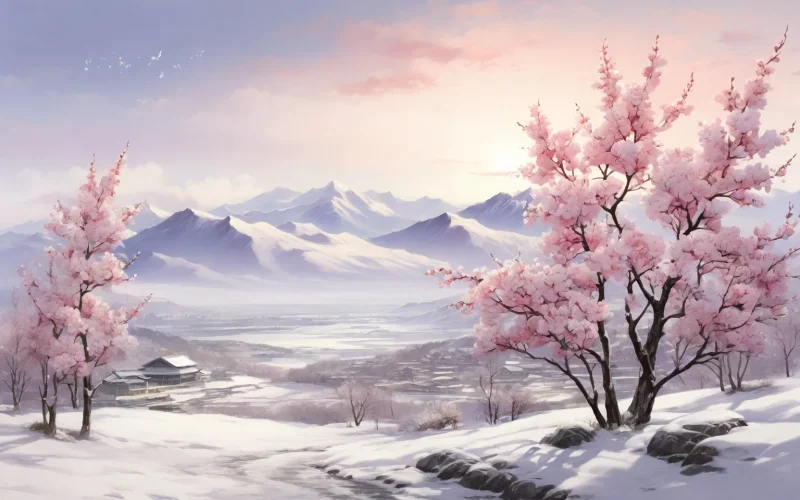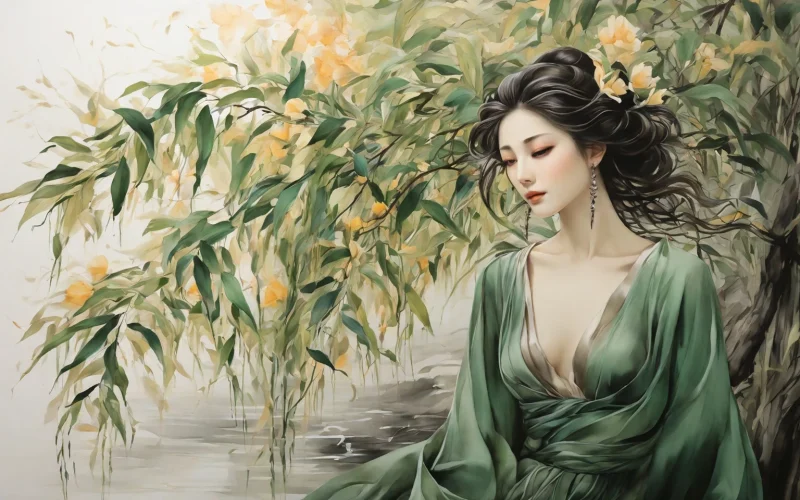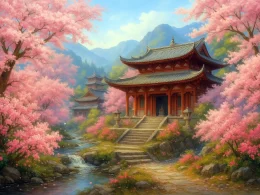Frozen are all the trees;
Your warm root will not freeze.
In the village's deep snow
Last night your branch did blow.
Fragrance oozed in wind light;
Birds peep at you still white.
If you blossom next year,
You will foretell spring's near.
Original Poem
「早梅」
齐己
万木冻欲折,孤根暖独回。
前村深雪里,昨夜一枝开。
风递幽香去,禽窥素艳来。
明年应有律,先发望春台。
Interpretation
This poetic ode to nature was composed by Tang Dynasty hermit-poet Qiji, who spent his life in mountain seclusion. Through vivid depiction of the first winter plum blossoms, the poem celebrates resilient purity while conveying the poet's unfulfilled ambitions. Blending natural observation with philosophical depth, it stands as a masterpiece of symbolic self-portraiture in classical Chinese poetry.
First Couplet: "万木冻欲折,孤根暖独回。"
Wàn mù dòng yù zhé, gū gēn nuǎn dú huí.
Ten thousand trees crack in frozen agony, While one plum's roots stir with warmth's mystery.
The opening contrast between perishing vegetation and the plum's secret vitality establishes the poem's central paradox. The "mysterious warmth" (暖独回) suggests both biological resilience and the poet's inner creative fire surviving intellectual winter.
Second Couplet: "前村深雪里,昨夜一枝开。"
Qián cūn shēn xuě lǐ, zuó yè yī zhī kāi.
Through village snowdrifts looming deep and high, A single branch bloomed beneath last night's sky.
This iconic couplet captures the plum's precocious defiance. The temporal marker "last night" (昨夜) emphasizes the blossom's sudden, almost clandestine appearance, mirroring how literary talent often emerges unrecognized in obscure circumstances.
Third Couplet: "风递幽香去,禽窥素艳来。"
Fēng dì yōu xiāng qù, qín kuī sù yàn lái.
Wind carries secret fragrance far and wide, While birds come peering at petals' snowy pride.
Sensory details animate the scene: the invisible fragrance (幽香) represents subtle intellectual influence, while the "peering birds" (禽窥) symbolize nascent recognition. The plum's white blossoms (素艳) reflect the poet's uncompromising aesthetic purity.
Fourth Couplet: "明年应有律,先发望春台。"
Míng nián yīng yǒu lǜ, xiān fā wàng chūn tái.
Next year when seasons turn as they should, May it bloom first at Spring-Viewing Terrace, where scholars stood.
The concluding hope transcends botany - the "Spring-Viewing Terrace" (望春台) was an imperial venue for talent selection. This transforms the poem into a metaphorical petition: as the plum anticipates its rightful flowering season, so too does the poet await his destined opportunity.
Holistic Appreciation
To the Early Mume Blossoms transcends mere nature poetry, emerging as a profound allegory of aspiration and resilience. Through the image of plum blossoms braving winter’s chill to bloom alone, the poet embodies steadfastness, purity, and an unwillingness to conform. The line "last night, a single branch blossomed" serves as a masterstroke, subtly conveying the fate of unrecognized beauty, while "next year, bound by nature’s law, it will again herald spring’s arrival" reveals the poet’s undimmed hope despite personal setbacks. Deceptively simple in language yet rich in meaning, the poem stands as a paradigm of lyrical expression through natural symbolism.
Artistic Merits
The poem ingeniously uses the early plum blossom as a vehicle for self-expression, mirroring the poet’s unyielding character and unfulfilled ambitions. Its refined yet natural diction—with phrases like "deep snow," "subtle fragrance," and "radiant purity"—creates a serene yet vivid tableau. Structurally, it progresses methodically: from winter’s barrenness to the plum’s solitary bloom, then to its fragrance attracting birds, and finally to the poet’s hopeful anticipation. This seamless fusion of scene and sentiment conveys the poet’s quiet yearning for recognition, making the work both visually evocative and emotionally resonant.
Insights
The poem teaches us that perseverance in adversity is a noble life stance. The early plum’s solitary bloom is not merely a natural wonder but a metaphor for upholding ideals and advancing with quiet confidence despite hardship. It also reminds us to recognize and cherish the "early plums" among us—those whose talents emerge ahead of their time yet go unnoticed. Only through societal openness and appreciation can such resilient spirits avoid withering in winter’s grip. The poem thus becomes a timeless meditation on the interplay between individual fortitude and collective recognition.
Poem translator
Xu Yuanchong (许渊冲)
About the Poet
Qi Ji (齐己), 863 - 937 A.D., known as a celebrated poet-monk of the late Tang Dynasty, hailed from Ningxiang County in Changsha, Hunan Province. Before becoming a monk, his given name was Hu Desheng. In his later years, he adopted the monastic title of “Sramana of Mount Heng.”











